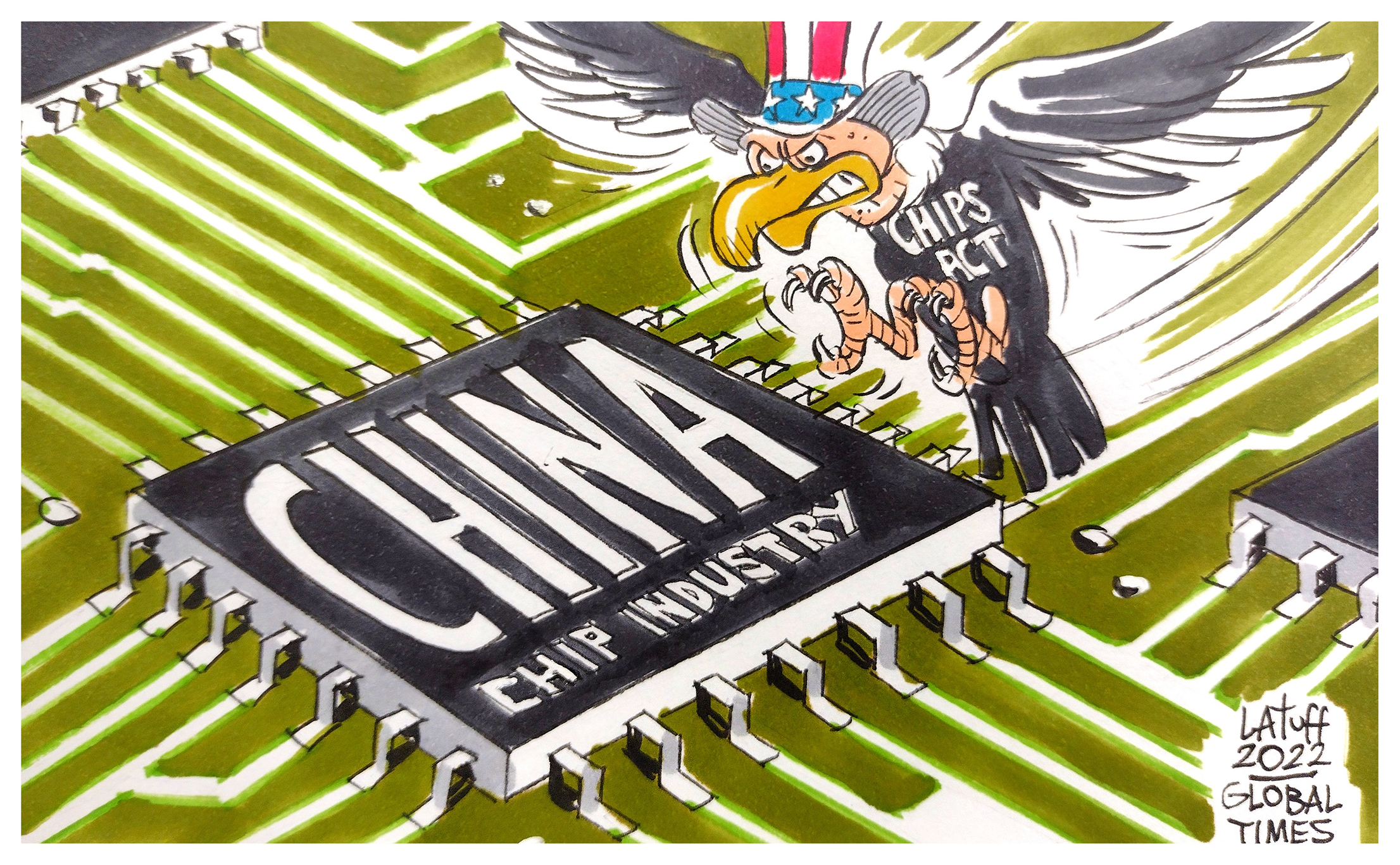얼마 전에도 IIS 측이 언급한 적이 있는데,
중국 측이 연일 미국의 대중 압박 정책에 대해 성토하는 글로 언론에 도배를 하는 것을 보면,
미국 바이든 정부는 기본적으로 대중국 반도체 압박 정책이 강력한 효과를 가진다는 것을 확신할 것이고,
비록 매우 무리한 정책이고, 향후 세계 경제에 어떤 좋지 않은 파장을 낼지 정확히 알수 없는 측면이 있다 하더라도,
일단 이 대중국 반도체 압박이라는 정책 기조 자체는 성공적이고, 또 앞으로 계속 유지하려고 할 것입니다.
물론 세부적이고 구체적인 정책 사안들에서 조정은 필요하고 압박은 강도 또한 지속적으로 조절하겠지만
첨단 반도체 압박이라는 미 백악관의 기본 정책 기조는 제대로 상대방에게 먹힌다는 것이고, 이를 향후 계속 유지하려고 할 것입니다.
이제 이 반도체 압박 전략 자체는 미국 당국의 핵심 대외정책으로 자리잡을 것이고,
미국 중국 양국이 얼마나 치열한 싸움을 하면서, 어떤 작전을 펼칠지, 어떤 전략을 누가 잘 구사하고, 누가 이길지 추이를 잘 지켜보면서
관련 국가들은 그에 맞춰 대응하고, 때론 진영에 가담하고, 작전에 참여하고...
한국 또한 주요 관계국으로 이 앞날이 불투명하고 향후 어떤 결과를 가져올지 예상이 되지 않는 치열한 국제 관계 게임에
어쩔 수 없이 참여하게 되어 버렸고,
이젠 미중 양국은 물론 관련국들의 국운까지 달려있을 지 모를 이 빅 게임에서
스스로 어떻게 일일이 처신하고, 어떤 국가와 어떤 측면에서 어떤 관계를 맺고, 얼마나 가담해야 하는지
수없이 많은 연속적 선택의 갈림길에 들어서게 된 것입니다.
아무래도 흐지부지 끝날 게임이 아닐 수 있습니다.
훗날 국운을 좌우하게 될 지도 모를 엄중한 현실에 마주하고 있는 상황일 수 있습니다.
우리 뜻대로 다 될 수도 없을 것이고, 우리가 주도권이 없는 부분이 많을 것이고,
우리가 어쩌지 못하는 거대한 벽에 여러 번 마주해야 할 지도 모릅니다.
뭐 최악의 상황이라면 이 게임에서 승자는 없을 지도 모르고, 세계 경제 불황을 초래하기만 하는 강대국들의 싸움터일 지도 모르고요.
우리로서는 늘 현명한 판단을 하고, 주변과 잘 협력하고, 최대한 자강력을 키워야 하고요.
지금 마주한 현실이 나중에 어떤 큰 결과로 이어질지 아무도 모르는 것이고요.
모든 것은 불투명하고, 우리로서는 우리가 할 수 있는 모든 것들을 동원해서 자국 산업을 보호해야 할 수 밖에 없습니다.
* 글 마지막 문단에서 뭐 중국측에서 주장하는 대응책이라고 주장하는 것들, WTO 제소나 자체 기술 개발 등등은 아직은 조금 내세우기 궁색한 수준이 아닌가 하는
생각도 듭니다.
물론 그래봤자 한국의 입장이 더 난처한 상황이라는 건 함정... ㅜㅜ
...... [2022-12-14] IIS 지식정보네트워크.
CHINA / DIPLOMACY
Washington reportedly ropes in allies to corner Beijing's semiconductor industry,
while China fights back with WTO lawsuit
By GT staff members
Published: Dec 13, 2022 09:46 PM Updated: Dec 13, 2022 09:34 PM

Production of semiconductor chip File photo: VCG
As the US mounts efforts to intensify its crackdown on China's chip industry, China strongly fought back by filing a lawsuit with the WTO over the US'
discriminatory(차별적인) measures, a move experts said is a smart action to solve a bilateral dispute under a multilateral mechanism and pave the way for further
counterattacks.
According to a Bloomberg report on Monday, Japan and the Netherlands have agreed in principle to join the US in tightening controls over the export of
advanced chip making machinery to China.
Jake Sullivan, the White House national security adviser, also said that the US has spoken with countries including Japan and the Netherlands to tighten
chip-related exports to China, a Reuters report noted.
This is the latest move of the US-initiated attacks against China's semiconductor industry after the Biden administration unveiled export controls in October that
ban Chinese companies from buying advanced chips and chip-making equipment without a license. The US also tried to form a chip alliance in
partnership with several Asian economies.
According to a statement posted by China's Ministry of Commerce (MOFCOM) on its official website, China has filed a lawsuit with the WTO over the US'
chip export control measures.
Chinese Foreign Ministry spokesperson Wang Wenbin said on Tuesday that the US' abuse of export control measures to hinder the normal
international trade of chips and other products will distort global semiconductor supply chains and disrupt international trade.
"All countries should step forward and Washington's unilateralism and protectionism should no longer be allowed to go unchecked. This is not only
related to the stability of the global trading system, but also concerns international morality," Wang said.

US claws at China’s chip industry fanning flames on tech confrontation. Cartoon: Carlos Latuff
Past failure
According to experts, the US' persuasion of some of its allies to join its export controls toward China is the latest practice Washington adopted to cripple China's
semiconductor industry, after it has already launched two stages of attacks against China's semiconductor sector.
One is imposing trade bans on Huawei to block the production of their flagship Kirin chipsets, and the second is establishing a chip alliance called Chip 4 with some Asian economies including Japan and South Korea to exclude China's semiconductor supply chains, they noted.
"This is a signal that the US is mounting a comprehensive blockade against China in the semiconductor sector, possibly extending from advanced manufacturing equipment and American chip technology to certain mature processing equipment and Japanese technologies," Zhang Xiaorong, director of the
Beijing-based Cutting-Edge Technology Research Institute, told the Global Times.
It also looks like a last-ditch move after many crackdown tactics adopted by the US targeting China have not achieved the desired effects, whether in terms of
trade or tech, experts said.
"The US' escalation in the chip war against China comes after its trade war has not progressed well, and the US government is desperate to show to its people that its measures against China are having some tangible results," independent tech analyst Ma Jihua told the Global Times.
As the Biden administration continues to increase chip export control measures, it is easy to see that the previous policies have not worked well, Ma said.
The US managed to hold a preliminary meeting on the Chip 4 alliance recently along with its allies, according to media reports, but news is coming out that officials from those "allies" are expressing doubts about following in the US' footsteps to go against China.
South Korea should take a careful approach in deciding whether to join the Chip 4 alliance, the Korea Times cited an official as saying in July.
Split alliance
After meeting some difficulties in pulling in South Korea to decouple from China's semiconductor supply chains, the US is again trying to win
support from Japan and lately the Netherlands, one which China is quite reliant upon for advanced chip producing machines while the other is
more obedient than South Korea to the US' semiconductor-related orders.
Fu Liang, a veteran tech analyst, told the Global Times on Tuesday that Japan's discourse power in the semiconductor industry is relatively weak as its
technological progress has lagged behind other nations in recent years, while consumption demands are also down.
"It lacks advantages of some companies such as Samsung whose competitiveness is strong and does not rely on external partners that much,"
Ma said, adding that Japan can't afford to offend such a big partner as the US.
However, experts stressed that Japan and the Netherlands will not accept all the US' requirements, as they have their own interests to care about.
Ma noted that in the case of the Netherlands, it may restrict exports of advanced products, but not mature ones because if it does not export, it
will lose the large Chinese market.
According to the 2021 financial statement of the Netherlands-based ASML, a leading global supplier of semiconductor production machines, the
Chinese market was its third-largest, accounting for a 14.7 percent share of its global revenue last year.
On the other hand, Japan also exports semiconductor products to China, while importing semiconductor materials from China. So a complete
decoupling means economic losses for the country, Ma noted.
Besides, experts said that the US' pressure on Taiwan Semiconductor Manufacturing Company to build a factory on US soil also sets a bad example for other countries, making them worry about loss of talent and advantages in the global chip supply chain, Ma said.
"The US is ambitious to build an independent and complete chip industry chain that is decoupled from China and is completely under its own
control. This will also mean the Netherlands and Japan have less say in global chip industrial chains, something which those two countries and
South Korea are concerned about," Ma said.
China's countermeasures
Experts also noted that China's countermeasures in the face of the US crackdown in the high-tech sector have grown increasingly mature over the years,
evolving from just making concessions like Chinese telecommunications giant ZTE did to taking varied countermeasures, including resorting to
international organizations and pushing domestic research of advanced chip technologies.
According to the MOFCOM statement, filing a lawsuit with the WTO is a way of seeking to address Chinese concerns through legal means, and a necessary way to defend China's legitimate interests, the ministry said.
"In recent years, the US has been generalizing the concept of national security and abusing export control measures, which hinders the normal international
trade in chips and other products, as well as threatening the stability of the global industrial chain and supply chain," the MOFCOM statement said.
The ministry urged the US to give up its zero-sum game mindset, correct its wrongdoings in a timely manner, and stop disrupting trade in high-tech products
such as chips, so as to maintain normal economic and trade exchanges between China and the US, and maintain the stability of the global supply chain.
China's legal action against the US in the WTO over chip export control measures shows that it hopes to solve the bilateral dispute under a multilateral
mechanism, making China's next counterattack more plausible, Ma said.
"Once China starts fighting back, it won't be just one policy, " he said, expecting that more countermeasures will be announced in the near future.
Chen Jia, an independent research fellow on international strategy, also commented that the world needs China's wisdom and contribution in terms of globalization and a new scientific and technical revolution, something which has been probed repeatedly during the past 40 years' of China's high-quality development.
"The US might achieve industrial decoupling with China in certain regions and in a short period of time, but it cannot endure, whether for itself or for its so-called allies," he said.






